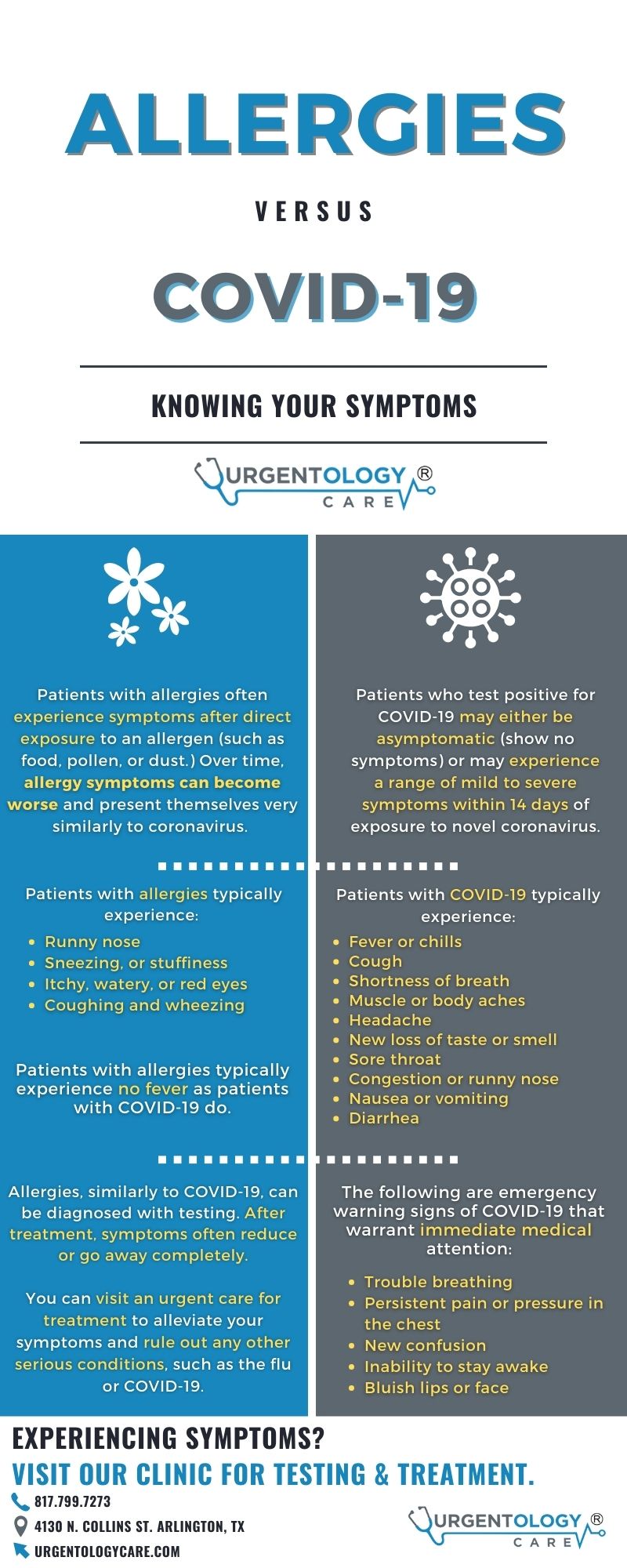Allergies or COVID-19: Diagnosing Your Symptoms
Allergy season is upon us once again, and we’re still confronting the coronavirus (COVID-19) pandemic here in Texas. One major concern we’re seeing is that patients are experiencing symptoms but are unsure if it’s allergies or the coronavirus.
While both share similar nasal and respiratory symptoms, they’re very different conditions. Keep reading to learn how to tell the difference, and how our team at Urgentology Care can help with both.
Do I Have Allergies?
Allergies are one of the most common illnesses that plague people when the seasons change — especially in the spring. Patients with allergies often experience symptoms after direct exposure to an allergen (such as food, pollen, or dust.) Allergies are an immune response to an allergen, which our immune system views as a threat.
Over time, allergy symptoms can become worse and present themselves very similarly to coronavirus. Patients with allergies typically experience no fever as patients with COVID-19 do.
However, patients with allergies typically experience:
- Runny nose.
- Sneezing, or stuffiness.
- Itchy, watery, or red eyes.
- Coughing and wheezing.
Read More: Common Allergy Symptoms: Ways to Prevent or Treat Them
Do I Have COVID-19?
COVID-19 is a respiratory illness caused by exposure to the SARS-CoV-2 strain of coronavirus or its variants. Patients who test positive for COVID-19 may either be asymptomatic (show no symptoms) or may experience a range of mild to severe symptoms within 14 days of exposure to novel coronavirus.
Patients with COVID-19 typically experience symptoms more closely related to the seasonal flu, including:
- Fever or chills
- Cough
- Shortness of breath
- Muscle or body aches
- Headache
- New loss of taste or smell
- Sore throat
- Congestion or runny nose
- Nausea or vomiting
- Diarrhea
When to Seek Treatment
Allergies, similarly to COVID-19, can be diagnosed with testing. After treatment, symptoms often reduce or go away completely. Patients may be prescribed a daily allergy pill or may be recommended for further treatment such as allergy shots and drops.
You can visit an urgent care for treatment to alleviate your symptoms and rule out any other serious conditions, such as the flu or COVID-19.
The following are emergency warning signs of COVID-19 that warrant immediate medical attention:
- Trouble breathing.
- Persistent pain or pressure in the chest.
- New confusion.
- Inability to stay awake.
- Bluish lips or face.
Seek Relief for Your Symptoms at Urgentology Care
If you feel that you may be experiencing symptoms and are unsure if you have allergies or COVID-19, stop by our clinic for an assessment. We can test you for COVID-19 or allergies and provide a proper treatment plan.


.2009010843550.png)
